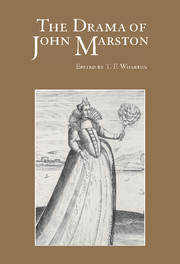Book contents
- Frontmatter
- Contents
- Notes on contributors
- Acknowledgements
- Note on the text
- Introduction
- 1 John Marston at the ‘mart of woe’: the Antonio plays
- 2 John Marston: a theatrical perspective
- 3 Varieties of fantasy in What You Will
- 4 Safety in fiction: Marston's recreational poetics
- 5 Insatiate punning in Marston's courtesan plays
- 6 Touching the self: masturbatory Marston
- 7 ‘Two parts in one’: Marston and masculinity
- 8 The Malcontent: hunting the letter
- 9 The Dutch Courtesan and the profits of translation
- 10 Sexual politics in Marston's The Malcontent
- 11 Marston: censure, censorship, and free speech
- 12 Ill-mannered Marston
- Index
1 - John Marston at the ‘mart of woe’: the Antonio plays
Published online by Cambridge University Press: 01 October 2009
- Frontmatter
- Contents
- Notes on contributors
- Acknowledgements
- Note on the text
- Introduction
- 1 John Marston at the ‘mart of woe’: the Antonio plays
- 2 John Marston: a theatrical perspective
- 3 Varieties of fantasy in What You Will
- 4 Safety in fiction: Marston's recreational poetics
- 5 Insatiate punning in Marston's courtesan plays
- 6 Touching the self: masturbatory Marston
- 7 ‘Two parts in one’: Marston and masculinity
- 8 The Malcontent: hunting the letter
- 9 The Dutch Courtesan and the profits of translation
- 10 Sexual politics in Marston's The Malcontent
- 11 Marston: censure, censorship, and free speech
- 12 Ill-mannered Marston
- Index
Summary
In their recent book on English drama, Shepherd and Womack link early modern theatrical competition to a struggle for ‘product identity’. Certainly, as argued by critics like Agnew, Bruster, and Shershow, theatre and marketplace materially interanimated each other in the period. Marston, however, seems to be the only dramatist self-conscious enough to realize that his drama competes in a ‘mart’ of reflexive professional play. Indeed, the OED defines the term ‘mart’ broadly as ‘a city, region, or locality where things are bought or sold’, quoting as figurative first use Marston's line near the end of Antonio's Revenge: ‘Farewell, mart of woe’ (IV.iii.177). The play involves spectacular celebration of revenge possibilities where recompense is made abruptly, horribly, ridiculously convenient, where – to quote one of the last lines of the play – ‘Never more woe in lesser plot was found’ (v.vi.59). I agree with Jonathan Dollimore that Marston's drama is ‘Radical’, but the serious philosophical intention that Dollimore attributes to the playwright seems to operate in an ‘irony-free’ zone. And Marston is nothing if not ironic (although other attributes – importunate, outrageous, and gleefully intertextual – also spring to mind). In fact, to take Marston seriously is to understand that his thrust is basically sensational, not moral; a matter of contemporary theatrical and popular culture, not ethical consistency excavated from the classics.
- Type
- Chapter
- Information
- The Drama of John MarstonCritical Re-Visions, pp. 14 - 26Publisher: Cambridge University PressPrint publication year: 2001

